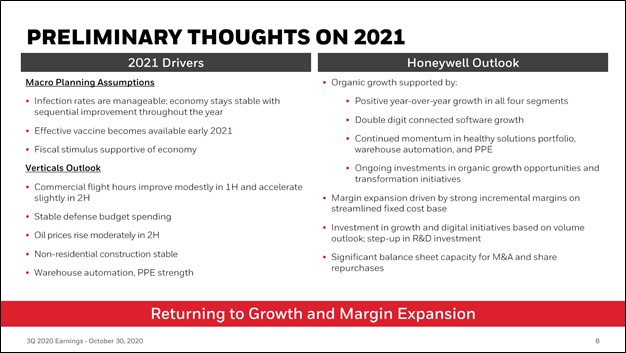
Image Shown: Honeywell International Inc expects its financial performance will post a significant rebound in 2021. Please note this guidance assumed a safe and viable COVID-19 vaccine would get distributed by early-2021, though distribution activities started before then in December 2020, which supports Honeywell’s near-term outlook. Image Source: Honeywell International Inc – Third Quarter of 2020 IR Earnings Presentation
By Callum Turcan
We added one of our favorite industrial stocks Honeywell International Inc (HON) to the Dividend Growth Newsletter portfolio on November 27 (link here) as the firm’s operational and financial performance has proven to be incredibly resilient in the face of the ongoing coronavirus (‘COVID-19’) pandemic. As global health authorities begin to put an end to the pandemic, aided by recent COVID-19 vaccine developments, Honeywell is well-positioned to capitalize on a global economic recovery. Shares of HON yield ~1.8% as of this writing and its Dividend Cushion ratio sits at 2.3, earning the firm a “GOOD” Dividend Safety rating. Please note that the forward-looking Dividend Cushion ratio and Dividend Safety rating incorporates our forecast that Honeywell will push through meaningful dividend increases in the coming years, so Honeywell’s foundation of dividend health is quite strong even considering future growth in the payout.
Operational Update
Honeywell’s ‘Safety and Productivity Solutions’ business operation segment has been a bright spot of late. In the third quarter of 2020, this segment’s sales were up 8%, its segment-level profit was up 12%, and its segment-level profit margin expanded by 50 basis points year-over-year. Productivity gains and greater economies of scale were cited by management as being key to improving this segment’s financial performance during the firm’s latest earnings call.
This segment offers various products and software including personal protection equipment (‘PPE’), workplace apparel, gear, and footwear for outdoor activities, gas detection technology, cloud-based notification and emergency messaging systems, equipment that helps enable supply chain and warehouse automation, customized sensors, software solutions for data and asset management productivity needs, and much more. Management noted that many of this segment’s offerings posted growth in the third quarter of 2020 during the firm’s latest earnings call including its PPE, mobility, and scanning products.
Another key offering (which is included across several of Honeywell’s business operating segments) is Honeywell Forge, which offers solutions that “digitally automate processes to improve efficiency while reducing downtime and safety costs.” During Honeywell’s third quarter of 2020 earnings call, management noted that the firm had established a partnership with Microsoft Corp (MSFT) that aims to integrate Honeywell Forge with the latter’s cloud-oriented “Dynamics’ field service to provide cloud-based predictive solutions to building owners and operators through closed loop maintenance workflows, strengthening business continuity and improving operational efficiency.”
Going forward, Honeywell and Microsoft are exploring ways to further integrate Honeywell Forge with Microsoft’s cloud-computing Azure operations. As an aside, Dynamics is Microsoft’s suite of cloud-based enterprise resource planning (ERP) and customer relationship management (‘CRM’) offerings.
Preventative Maintenance a Key Trend
The company’s ‘Honeywell Building Technologies’ business operating segment sells products, services, and software including systems for monitoring and managing energy systems in buildings, video surveillance offerings, remote patient monitoring systems, and access control systems, and services related to installing, maintaining, and upgrading building systems. Honeywell’s deal with Microsoft will allow the company to bulk up its preventive maintenance offerings which represents a secular growth market. These are offerings that can detect problems and potential problems ahead of time. In the case of buildings, the preventative maintenance system could detect systems that may need to be repaired–or are at risk of failing–significantly faster than traditional detection methods (given the advantages of digitized monitoring systems). Such building technologies can save the customer significant sums of money by detecting major problems ahead of time.
During the third quarter of 2020, the ‘Honeywell Building Technologies’ segment experienced an 8% year-over-year decline in sales. However, its segment-level operating profit fell by just 5% year-over-year as its segment-level profit margin expanded by 60 basis points year-over-year, due primarily to effective cost control measures implemented during the pandemic. Some of the sales decline was attributed to various quarantine efforts worldwide according to recent management commentary. Management cited strong backlog growth at some of the ‘Honeywell Building Technologies’ core offerings during the firm’s latest earnings call (emphasis added, lightly edited):
“Orders for the business solutions projects and energy businesses both grew double digits organically in the third quarter. Additionally, the building solutions service backlog was up double digits year over year, driven by larger orders in the Middle East and Asia. We are experiencing significant customer momentum with our portfolio of healthy building solutions. Our sales pipeline is over $600 million, and we have secured orders around the world from Charlotte to Singapore. [The Honeywell Building Technologies segment’s] margins expanded versus last year by 60 basis points in the quarter, driven by commercial excellence and cost actions to improve productivity, which offset the impact of lower sales volumes.” — Greg Lewis, CFO of Honeywell
Aerospace and Energy End Markets Still Weak But Recovering
Pivoting now to Honeywell’s ‘Aerospace’ and ‘Performance Materials and Technologies’ business operating segments, both have faced significant headwinds due to the COVID-19 pandemic. Delayed commercial airplane deliveries (particularly for commercial airliners) and a sharp slowdown in global commercial airplane production combined with subdued demand from customers in the oil & gas industry (due to lackluster demand for refined petroleum products and various petrochemical products worldwide) weighed negatively on these operations, though those headwinds should start to abate going forward. A recovery on these two fronts should enable Honeywell’s financials to stage an impressive recovery, especially when combined with strength at its other two business operating segments.
We want to stress that Honeywell is much more than just an “old-guard” industrial company. Honeywell’s digitally-focused businesses, such as Honeywell Forge, represent its way of adapting to the changing needs of the 21st Century and allows the firm to offer a more comprehensive slate of products and solutions for its customers. Additionally, Honeywell’s automation-oriented offerings are likely to be in high demand over the coming years as its enterprise customers seek to improve efficiency while reducing costs. Certain tasks can be quite risky and/or time consuming, and by automating those endeavors, Honeywell offers its customers a way to boost their productivity, improve their cost structure, and better ensure the safety of their workforce.
Financial Update
Unlike some of its industrial peers, Honeywell’s balance sheet is quite strong, relatively speaking. At the end of September 2020, Honeywell had $15.0 billion in cash, cash equivalents, and short-term investments combined on the books. Stacked up against $4.5 billion in short-term debt and $17.7 billion in long-term debt, Honeywell’s net debt load of ~$7.2 billion is manageable, in our view. During the first nine months of 2020, Honeywell generated $2.5 billion in free cash flow. Though down year-over-year, we are impressed with the firm’s ability to generate sizable free cash flows in the face of serious exogenous headwinds.
During the first nine months of 2020, Honeywell spent $1.9 billion covering its dividend obligations and $2.1 billion buying back its stock. Honeywell effectively completed its 2020 share repurchasing program in the first quarter of 2020 according to management commentary given during the firm’s earnings call covering that period, though during Honeywell’s third quarter of 2020 earnings call, management noted the firm planned to resume share buybacks in the fourth quarter of 2020. We would prefer Honeywell improve its balance sheet, though given its ample liquidity on hand and ability to generate sizable free cash flows in (almost) any environment, Honeywell should still be able to improve its financial position going forward as the global economy recovers.
Concluding Thoughts
We are big fans of Honeywell and are impressed with the resilience of its business model. Honeywell continues to improve its digital operations, and we are intrigued by its recent strategic partnership with Microsoft. Expanding this partnership and further integrating Honeywell’s industrial, productivity, and building management solutions with Microsoft’s cloud-computing operations would go a long way in improving Honeywell’s digital-oriented offerings, which in turn would support Honeywell’s long-term cash flow growth outlook.
As the distribution of Pfizer Inc’s (PFE) and BioNTech SE’s (BNTX) COVID-19 vaccine, which recently received emergency authorization by the US Food and Drug Administration (‘FDA’), has now begun in the US, Honeywell’s outlook has improved significantly of late. As demand from its aerospace and oil & gas customers recovers, Honeywell’s cash flows should experience a nice uplift. That dynamic, along with Honeywell’s stellar cash flow profile, supports our view that the company will push through meaningful dividend increases over the coming years.
Honeywell’s Stock Report (pdf) >>
Honeywell’s Dividend Report (pdf) >>
Related Competitors
Aerospace: Garmin (GRMN), Safran (SAFRY, SAFRF), Thales (THLEF), Raytheon Technologies (RTX)
Honeywell Building Technologies: Johnson Controls (JCI), Schneider Electric (SBGSF, SBGSY), Siemens (SIEGY)
Performance Materials and Technologies: Albemarle (ALB), BASF (BASFY), Dupont (DD), Emerson Electric (EMR), Sinopec (SHI) and Yokogawa (YOKEF, YOKEY)
Safety and Productivity Solutions: 3M (MMM), Kion Group (KIGRY, KNNGF), Mine Safety Applications (MSA), TE Connectivity (TEL), Zebra Technologies (ZBRA)
—–
Valuentum members have access to our 16-page stock reports, Valuentum Buying Index ratings, Dividend Cushion ratios, fair value estimates and ranges, dividend reports and more. Not a member? Subscribe today. The first 14 days are free.
Callum Turcan does not own shares in any of the securities mentioned above. Honeywell International Inc (HON), Lockheed Martin Corporation (LMT) and Republic Services Inc (RSG) are all included in Valuentum’s simulated Dividend Growth Newsletter portfolio. Health Care Select Sector SPDR Fund (XLV) and Microsoft Corporation (MSFT) are both included in Valuentum’s simulated Best Ideas Newsletter portfolio and simulated Dividend Growth Newsletter portfolio. Some of the other companies written about in this article may be included in Valuentum’s simulated newsletter portfolios. Contact Valuentum for more information about its editorial policies.
